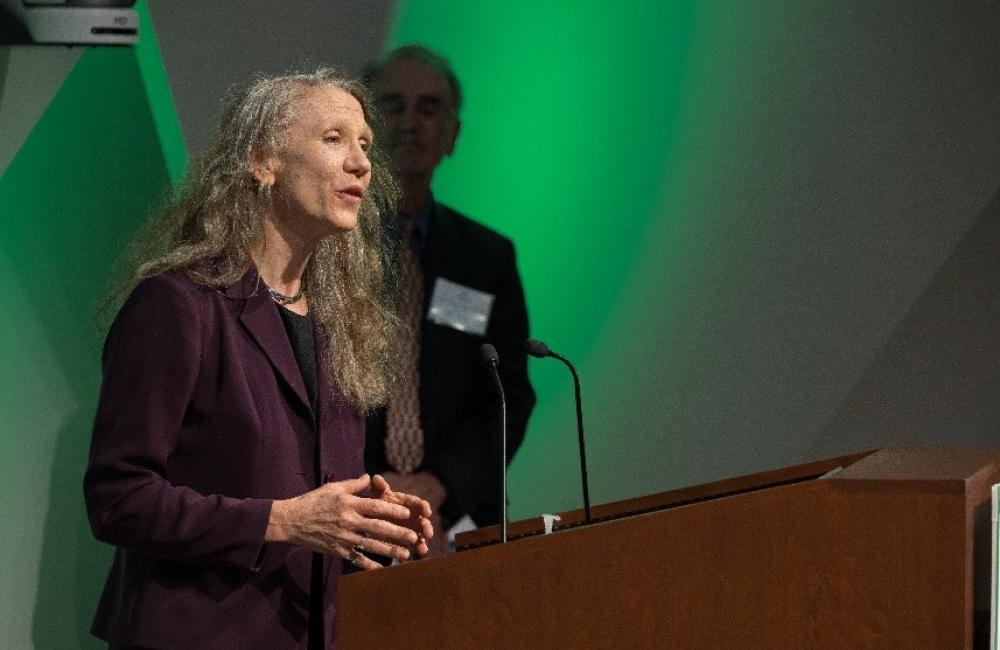Kim Tutin, founder and chief executive officer of Captis Aire, receives the EPA Green Chemistry Challenge Award. Credit: Eric Vance/USEPA
The founder of a startup company who is working with the Department of Energy’s Oak Ridge National Laboratory has won an Environmental Protection Agency Green Chemistry Challenge Award for a unique air pollution control technology.
Captis Aire— founded by Kim Tutin, a fellow of ORNL’s Innovation Crossroads program — is built on Tutin’s Chemical Adsorption Innovation that Reduces Emissions, or CAIRE, technology, which captures pollutants from the air and provides raw materials for a variety of industries. The EPA award recognizes the technology’s game-changing potential in industries that release organic compounds into the air.
“We’re very proud of the EPA award and its recognition of the value of the CAIRE technology,” Tutin said. “I am extraordinarily and forever indebted to Oak Ridge National Laboratory and particularly the Innovation Crossroads program.”
Innovation Crossroads is a DOE Lab-Embedded Entrepreneurship Program node based at ORNL. The two-year fellowship program leverages ORNL’s unique scientific resources and capabilities and connects the nation’s top innovators with experts, mentors and networks in technology-related fields to take world-changing ideas from research and development to the marketplace.
“Captis Aire is creating valuable products from a waste stream that would typically be burned. It’s an innovation that creates economic benefit and contributes to the nation’s clean energy goals,” said Dan Miller, program lead for Innovation Crossroads. “It’s a well-deserved honor, and we’re excited for Kim and the success of her company.”
The patent pending technology converts terpenes, a waste product released during the wood manufacturing process, into valuable chemicals. Today, these terpenes are burned as waste, which releases greenhouse gases that contribute to global warming. The technology captures more than 90% of the terpenes released from the wood products manufacturing process and converts them into valuable chemicals including those used in products such as biofuels, flavors and fragrances, according to the EPA.
The EPA Green Chemistry Challenge Award was given Oct. 23 at the National Academy of Sciences in Washington, D.C.
Tutin is quick to credit Innovation Crossroads for making it possible for her to commercialize the invention. Prior to her inclusion in the program, she said she had been working fulltime for three years, pitching her technology to industry with little to show for it.
“It was going nowhere, to be honest,” she said. “Then as soon as Innovation Crossroads and Oak Ridge National Laboratory picked me up, so to speak, all of a sudden we started getting a lot more attention.”
That attention has translated to increased grants and awards and, perhaps most importantly, interest from customers and key stakeholders. The company has won four awards, including this one from the EPA and one from Launch Tennessee, in the past year. Launch Tennessee is a nonprofit organization that supports the state’s startup ecosystem with grants and training. Also, Tutin is working with a wood products manufacturing facility in North Carolina to demonstrate the technology.
Tutin discovered Innovation Crossroads from a LinkedIn post promoting a webinar about the program. After following up with Miller, she applied and was accepted. The program provided mentorship and education about developing go-to market strategies and how to pitch the technology.
“They taught us how to communicate what we’re doing more effectively, and how to talk to investors, providers and government agencies,” Tutin said.
The company will continue to develop the technology with ORNL researchers Andrew Sutton and Nidia Gallego under a cooperative research and development agreement, or CRADA.
UT-Battelle manages ORNL for DOE’s Office of Science, the single largest supporter of basic research in the physical sciences in the United States. DOE’s Office of Science is working to address some of the most pressing challenges of our time. For more information, visit energy.gov/science. — Lawrence Bernard






